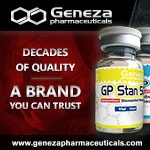[h=1]Fot those arent sure what telomeres are, its highly recommended you research them. Then you'll better understand why IGF-1 lr3 is touted as the fountain of youth, and why so many claims have been made as to how well IGF-1 works in reversing the aging process. Yes Reversing, Not just slowing down the aging process, but literally reversing it.
Pubmed on IGF-1 and Telomeres!
Higher circulating levels of IGF-1 are associated with longer leukocyte telomere length in healthy subjects.[/h][h=3][/h]
[h=3]Abstract[/h]
<abstracttext>Mutations that inhibit the insulin-like growth factor-1 (IGF-1) extend the lifespan of worms, flies and mice. However, it appears that relatively low circulating levels of IGF-1 in humans are associated with aging-related diseases and diminished longevity. As leukocyte telomere length (LTL) is ostensibly a biomarker of human aging, we examined the relationship between LTL and blood IGF-1 in a healthy cohort. Our sample comprised 476 healthy, unrelated Caucasians (208 men and 268 women), aged 16-104 years, living in the West Coast of Southern Italy. We measured LTL by Southern blots and IGF-1 by enzyme-linked immunoassay. Both IGF-1 and LTL diminished with age (IGF-1, r=-0.601, P<0.001; LTL, r=-0.706, P<0.001). Age-adjusted LTL was positively associated with IGF-1 level throughout the age range of the cohort (r=0.270, P<0.001). IGF-1 accounted for about 10% of the inter-individual variation in LTL over and above the effect of age. Our findings suggest that both circulating IGF-1 and LTL are indices of healthy aging in humans. Further research will be necessary to establish whether LTL will ultimately be used in clinical settings as an index of healthy aging.</abstracttext>
Pubmed on IGF-1 and Telomeres!
Higher circulating levels of IGF-1 are associated with longer leukocyte telomere length in healthy subjects.[/h][h=3][/h]
[h=3]Abstract[/h]
<abstracttext>Mutations that inhibit the insulin-like growth factor-1 (IGF-1) extend the lifespan of worms, flies and mice. However, it appears that relatively low circulating levels of IGF-1 in humans are associated with aging-related diseases and diminished longevity. As leukocyte telomere length (LTL) is ostensibly a biomarker of human aging, we examined the relationship between LTL and blood IGF-1 in a healthy cohort. Our sample comprised 476 healthy, unrelated Caucasians (208 men and 268 women), aged 16-104 years, living in the West Coast of Southern Italy. We measured LTL by Southern blots and IGF-1 by enzyme-linked immunoassay. Both IGF-1 and LTL diminished with age (IGF-1, r=-0.601, P<0.001; LTL, r=-0.706, P<0.001). Age-adjusted LTL was positively associated with IGF-1 level throughout the age range of the cohort (r=0.270, P<0.001). IGF-1 accounted for about 10% of the inter-individual variation in LTL over and above the effect of age. Our findings suggest that both circulating IGF-1 and LTL are indices of healthy aging in humans. Further research will be necessary to establish whether LTL will ultimately be used in clinical settings as an index of healthy aging.</abstracttext>









